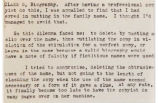| Title |
Father Fought the Desert |
| Creator |
Carlton Culmsee |
| Identifier |
Utah_State_Archives_Box_01_Folder_01.pdf |
| Publisher |
Digitized by J. Willard Marriott Library, University of Utah |
| Date |
1975 |
| Description |
Young Adult Biography (Honorable Mention); Carlton Culmsee, Father Fought the Desert |
| Rights Management |
Digital Image © 2010 University of Utah. All Rights Reserved. |
| Digitization Specifications |
Original scanned on Kirtas 2400 and saved as 400 ppi 8 bit grayscale jpeg. Display image generated in Kirtas Technologies OCR Manager as multiple page pdf, and uploaded into CONTENT dm. |
| Language |
eng |
| Holding Institution |
J. Willard Marriott Library, University of Utah |
| Scanning Institution |
J. Willard Marriott Library, University of Utah |
| Format |
application/pdf |
| Type |
Text |
| Scanning Technician |
Jason Vancott |
| ARK |
ark:/87278/s6fr2qsw |
| Setname |
dha_uac_wcm |
| ID |
132518 |
| Reference URL |
https://collections.lib.utah.edu/ark:/87278/s6fr2qsw |



























































































































































































